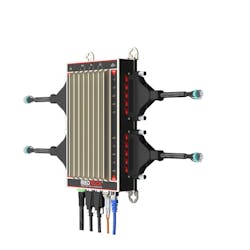Remote control capabilities have been among the top trends in manufacturing over the past few years. But they've also been among the top reasons for concern across industry because of the potential openings the technology creates for hackers.
To ensure that we’re all on the same page in terms of what remote monitoring and control refers to, we're talking about the ability to access human-machine (HMI) and supervisory control and data acquisition (SCADA) data remotely on a mobile or desktop device so that operational data can be viewed anywhere, at any time. Reasons for access to this data can range from executive business analysis purposes to engineering diagnostics.
Of course, for this data to be accessible remotely it needs to be exposed to online networks. And that’s where the cybersecurity concerns enter the picture.
To address this, Bedrock Automation, maker of the Bedrock Open Secure Automation System (OSA), which has already been widely recognized for its cybersecurity protections, announced that it has received Achilles Level 2 certification for its OSA Remote controller. According to the company, the OSA Remote delivers Bedrock Automation’s intrinsic cyber security protection in a compact unit that provides programmable logic controller (PLC) and SCADA remote terminal unit (RTU) functionality for monitoring and control of up to 20 universal I/0, as well as serial and industrial Ethernet I/O.
“The demand for a secure remote controller is high—especially from the oil and gas market and water treatment plants needing to implement SCADA RTU and PLC applications,” said Bedrock Automation founder and CEO, Albert Rooyakkers. “Achilles Level 2 provides independent validation of our unique approach to intrinsic cyber hardening.”
The Achilles Test Platform, from GE Digital (Wurldtech), helps manufacturers of mission critical infrastructure solutions ensure that their products are not vulnerable to cyberattacks. It tests the communications robustness of networks and operational parameters, identifying vulnerabilities and reproducing, isolating and resolving faults that cause them. The battery of tests used in the Achilles Test Platform are based on extensive experience in working with manufacturers of automation devices to verify and validate performance under real-world conditions, such as denial of service (DoS) attacks.
Rooyakers explained that the Achilles certification is “a vendor-neutral communications robustness test/certification, primarily of a device’s ability to withstand denial of service (DoS) attacks while maintaining control of output variables. DoS is one of many attack vectors and therefore one of potentially several forms of cyber security vulnerability. Other attack vectors include unauthorized access to the control system hardware, software and applications.”
Achilles certification is fairly common in Europe, according to Rooyakers. “Many European ICS vendors have Achilles certification across their product lines,” he said. “While leading U.S.-based suppliers have very few products [that are Achilles Level 2] certified. Only Bedrock delivers comprehensive intrinsic cyber defense, of which Achilles Level 2 is one key part.”
“Achilles Level 1 was the first Achilles certification program to test the robustness of the communication protocols,” said Rooyakers. “Level 2 certification meets the requirements of Level 1 and involves more Domain Name System (DNS) tests at higher link rates, with more stringent requirements to pass.”
Bedrock Automation notes that its new OSA Remote, like all of the company’s products, are manufactured with a secure supply chain on U.S. soil at a Bedrock secure facility. "The results are layers of cyber protection and due diligence that are unmatched in its industry," the company adds.
As with all other Bedrock Automation products, the compact OSA Remote features more than 30 embedded cyber security technologies, including public key infrastructure (PKI) with secure keys inserted at birth, and advanced authentication and encryption capabilities for SCADA.
“All of this is in a system device that fits in the palm of the hand and at prices often below conventional PLCs or RTUs,” said Rooyakers.
For more information on OSA Remote visit www.bedrockautomation.com/products/OSA-Remote
Leaders relevant to this article:


